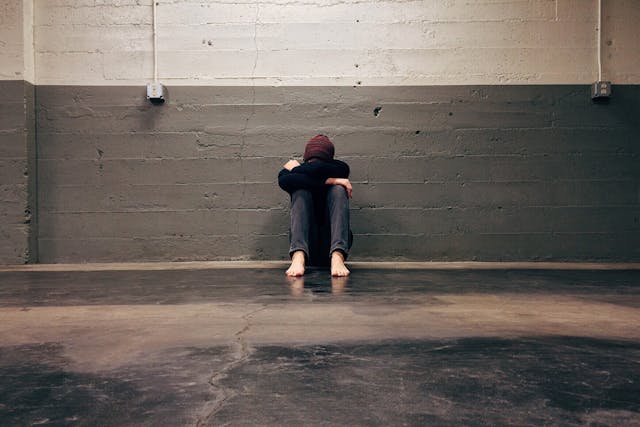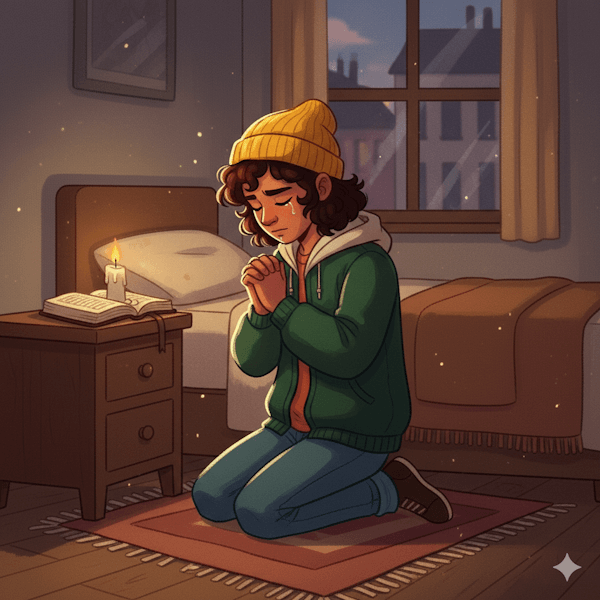Dealing with anxiety starts by recognizing that feeling that your mind is a radio station stuck in a catastrophic news channel, recurring the question ‘what if…?’.
You lay your head on the pillow, but your heart races, burdened with tomorrow’s concerns, finances, health, family.
Anxiety is one of the most universal and insulating experiences of modern life. Being a Christian does not make us immune to it. In fact, often, the fight is accompanied by an extra layer of guilt, asking us if our anxiety is a sign of lack of faith.
If you are on this boat, know that your feeling is valid and that you are not alone. The Bible is full of men and women of faith who fought with anguish. What the Word of God offers us, however, is not an absence of problems, but the presence of a peace that transcends them.
In this article, we will walk together on a path of hope, exploring what the Bible really teaches about dealing with anxiety, discovering the liberating solution of the gospel and learning practical steps to cultivate a heart that trusts and rests in God.
Understanding the root of our restlessness
To find the right cure, we first need the right diagnosis. Although anxiety has real psychological and physical components, the Bible diagnoses it, in its essence, as a spiritual issue.
This discomfort is a symptom, a ‘warning light’ on the panel of our soul that signals a deeper problem in our trust system.
Anxiety thrives on the ground of self-sufficiency and the attempt to control the uncontrollable.
It is the burden we carry when we try to sit on the throne of God, assuming the responsibility of managing the universe.

The Anatomy of Concern
Jesus, in his most famous sermon, makes an accurate diagnosis of anxiety in Matthew 6:25-34. It connects it directly with concern about the future – what we will eat, what we will wear, what will happen tomorrow.
The logic of Jesus is simple and profound: the concern is useless (‘Which of you, no matter how much you care, can add a time to your life?’) and unnecessary for a child of God (‘For the Heavenly Father knows that you need of them’).
He shows us that the root of anxiety is a spiritual amnesia: we forget who our Father is.
We forget his providence, his detailed care by the birds of the sky and the lilies of the field, and our immense value to Him. Anxiety, therefore, flourishes when our perspective is focused on our limitations, and not on the infinite capacity of our Father.
A symptom of a disheveled heart
Anxiety is not necessarily a ‘sin’ but it is often a symptom of a heart that has placed its trust in the wrong place.
The book of Proverbs gives us the antidote:
‘Trust in the Lord with all your heart and do not lean on your own understanding; recognize the Lord in all his ways, and he will straighten his paths’
Proverbs 3:5-6
Anxiety is what we feel when we rely on our own understanding. It is the tremor of an unstable foundation. Our foundations can be our job, our health, our bank account or the approval of others.
When any of these things are threatened, anxiety soars, because our security is built on them.
The biblical diagnosis calls us to verify our foundations and to consciously transfer the weight of our trust to the only unshakable rock: the character and promises of God.
The solution in the Gospel: The peace that the world cannot give
If the diagnosis for anxiety is a heart that does not fully trust, the solution cannot simply be ‘trust!’.
That would be just another burden, another performance to try to execute.
The beauty of the Gospel is that it does not give us a list of tasks, but an announcement of a finished work.
The fundamental solution to our anxiety is not in our effort, but in the work of Christ for us.

Peace with God that precedes the peace of God
The deepest source of human restlessness is our separation from God because of sin. Without this reconciliation, we could never experience true peace. This is where the gospel comes in as the ultimate solution.
Romans 5:1 declares, ‘Having therefore been justified by faith, we have peace with God by our Lord Jesus Christ.’
Because of Jesus’ sacrifice on the cross, the war between us and God is over. We were reconciled. This ‘peace with God’ is an objective fact, a new legal condition.
It is from this fundamental peace that we can begin to experience the ‘peace of God’ in our daily lives – the peace that guards our heart and mind. The solution to anxiety does not begin with breathing techniques, but with surrender to the Prince of Peace.
Jesus’ invitation to rest
The Gospel is not a call to a heavier burden, but an invitation to rest. In Matthew 11:28-30, Jesus makes one of the sweetest invitations in all of Scripture:
‘Come to me, all who are tired and overwhelmed, and I will give them rest.
Take my yoke upon you and learn from me, for I am meek and humble of heart, and you will find rest for your souls. For my yoke is soft and my burden is light.’
Anxiety is a heavy burden. Trying to control life is exhausting. Jesus invites us to exchange our heavy burden of self-sufficiency for his light burden of graceful dependence.
Resting in Christ means stopping trying to manage our own salvation, our own future and our own holiness, and trusting that He is sufficient for all of this.
Practical steps of transformation: cultivating trust and rest
Peace with God is a gift received once and for all. The peace of God is a fruit to be cultivated day by day.
With the foundation of the gospel firmly established, we can now adopt spiritual practices that help us live in this peace.
The following are four practical steps of transformation to help you deal with anxiety.

1. The practice of delivery
Anxiety persists when we keep problems in our own hands. Prayer is the divinely ordained means to transfer these burdens to God’s capable hands.
the principle
‘Lay all your anxiety about him, because he takes care of you’
1 Peter 5:7
The word ‘throw’ here is an active verb. It is a conscious decision to take the burden and throw it over God. Philippians 4:6-7 gives us the script: instead of anxiety, prayer with gratitude.
How to live this principle
Create an ‘anxiety inventory’. Take a notebook and list specifically Every thing that is weighing on your mind.
Don’t write ‘money’, but ‘the concern of how to pay the invoice X this month’. Then, go through each item in prayer, saying aloud, ‘Father, I give you this burden. I confess that I cannot solve it, but I trust that you take care of me’.
Question for reflection
What specific burden are you carrying today that needs to be delivered to Jesus’ feet right now?
2. Meditation on the Word
Anxiety feeds on the lies of ‘what if…?’. Peace feeds on the truth of ‘God is…’. We need to intentionally fight the lies that our anxious mind creates with the unshakable truth of the Word of God.
‘You shall keep the one whose mind is steadfast in you, for he trusts in you’ (Isaiah 26:3).
Peace is a consequence of a ‘firm’ mind – supported, sustained – in the truth of whom God is.
arsenal of truth
Identify the main lie your anxiety is telling you (ex: ‘You will fail’, ‘God forgot you’). Then find 2 or 3 biblical promises that annihilate this lie (Ex: Philippians 4:13, Hebrews 13:5).
Write these verses on a card and carry it with you. When the eager thought attacks, pull your ‘arsenal’ and counterattack with the truth of the word.
Question for reflection
What specific Bible promise can be your anchor for the main anxiety you are feeling this week?
3. The practice of gratitude
It is spiritually impossible to be grateful and anxious at the same time. Anxiety focuses on what may be lacking in the future; Gratitude focuses on what God has already provided in the past and the present. Gratitude is a discipline that redirects our hearts.
‘Give thanks in all circumstances, for this is the will of God for you in Christ Jesus’
1 Thessalonians 5:18
Gratitude does not deny the existence of the problem, but declares that the presence of God is greater than the problem.
Diary of Gratitude
Every night, before bed, list three specific things that happened that day you are grateful for. The challenge is not to repeat. This will train your brain to actively search for evidence of God’s goodness around you, even on difficult days.
Question for reflection
Even in the midst of your current situation, what are the three things you can genuinely thank God for right now?
4. The practice of presence
Anxiety is the act of trying to live tomorrow with the grace of today, which is impossible. Peace is found by embracing the sufficient grace of God for the present moment.
‘So don’t worry about tomorrow, for tomorrow will care about yourself. It’s enough every day your own evil’
Matthew 6:34
Jesus invites us to live in the watertight compartment of ‘today’.
Next Step Prayer
When you feel overwhelmed with the immensity of a future problem, stop and pray: ‘Lord, I trust you tomorrow. Show me only the next step of obedience I must give today.’
Divide the mountain into small walkable steps. Do what is possible today and trust the impossible of tomorrow to God.
Question for reflection
What is the only next step of faith and obedience that God is asking you to give today, in relation to your biggest concern?
Conclusion: Dealing with anxiety
Learning how to deal with anxiety is not a one-time event, but an ongoing journey of learning to trust and rest. There will be days when the peace of God will be palpable and days when the storm of worry will appear strong.
In all of them, the gospel solution remains the same: we have peace with God through Christ, and He invites us to rest in His sovereign care. Don’t blame yourself for the days of struggle; Instead, see them as an invitation to run again into the father’s arms.
The victory over anxiety is not the absence of anxious feelings, but the decision to, despite them, continue to deliver, trust and thank.
Remember, change is a process, and God, the author and consummator of our faith, is faithful to complete the good work He has begun in you.
Keep practicing these steps, not as a formula for manipulating God, but as a way to deepen your intimacy with Him, the God of all peace.
“God of Peace”, a sermon by Charles Spurgeon
For your final meditation, listen to this mighty Charles Spurgeon’s Sermon about the true and lasting peace that only God can offer.
Play and be blessed!
- Aroer – 10 de October de 2025
- Aijalom of Zebulun – 10 de October de 2025
- Aijalom of Dan – 10 de October de 2025